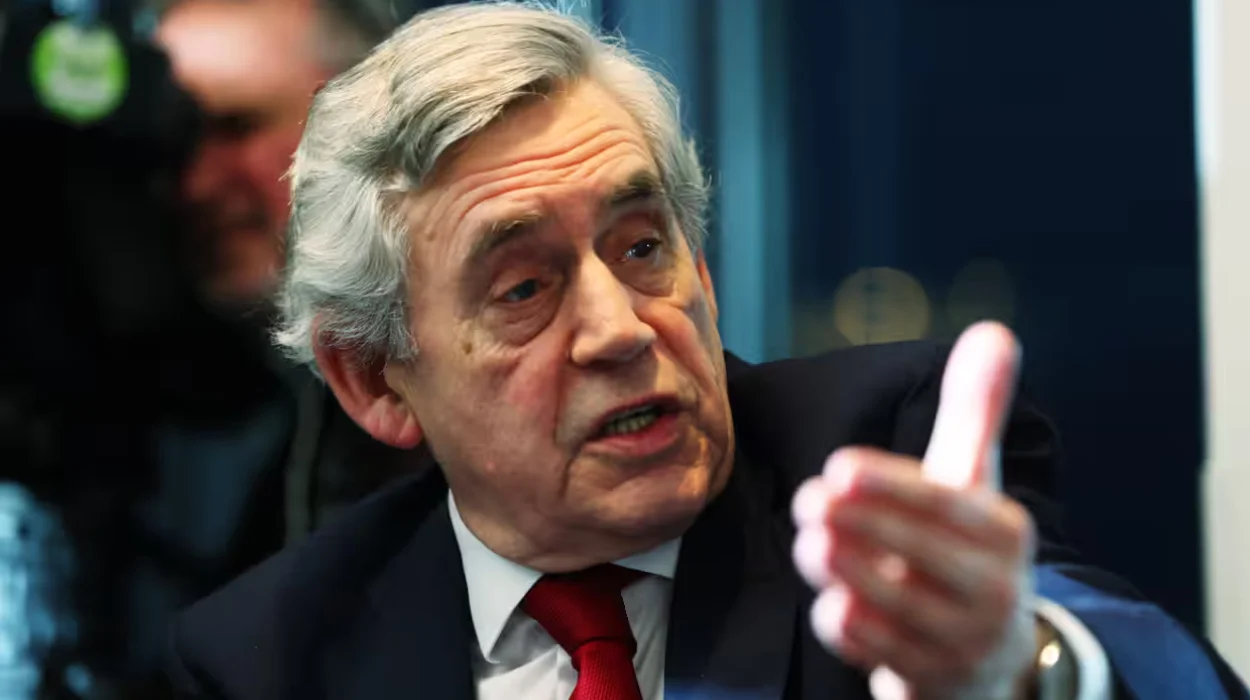UK (Parliament Politics Magazine) – Gordon Brown urges world leaders to form an economic alliance to address Trump-era tariffs and deepen EU ties amid rising global trade tensions.
Former Prime Minister Gordon Brown, a member of the Labour Party, advocates for an “economic coalition of the willing” in response to Trump’s tariffs. He proposed coordinated policies, including lowering interest rates to mitigate the impact.
What did Gordon Brown say about renewing UK-EU ties and Trump’s tariffs?
According to the ex-PM, it’s the right moment for Britain to strengthen relations with the EU, proposing
“collaboration that is even more extensive than removing post-Brexit trade barriers.”
Mr Brown, a close ally of Keir Starmer, urged world leaders to act more decisively, warning,
“We are seeing a simultaneous breakdown in economic and geopolitical orders.”
As reported by the Guardian, he highlighted the need to learn from the 2008 financial crisis, including providing businesses extended credit, lowering interest rates, and mobilising the World Bank and IMF to protect nations from the impact of tariffs.
Mr Brown said,
“We need an economic coalition of the willing: like-minded global leaders who believe that, in an interdependent world, we have to coordinate economic policies across continents if we are to safeguard jobs and living standards.”
Highlighting the lessons of the financial crash, he stated,
“Global problems require globally coordinated solutions. We need a bold, international response that matches the scale of the emergency.”
While criticizing Trump, Mr. Brown claimed that
“the world is being brought to its knees by one economy, outside which live 96% of the population, who produce 84% of the world’s manufactured goods.”
The former prime minister suggested that world leaders should consider offering extended credit to exporting and importing firms, noting that “it was central to the global response as trade collapsed in 2009.”
He further warned that one of the critical threats was a collapse in consumer confidence and the decline in business investment, adding,
“That means we may need a synchronised reduction in interest rates – an initiative the US might well join – backed by fiscal activism in the countries where there is space to expand.”
Mr Brown stressed that global leaders should be mindful of China’s position, adding that Beijing needed to recall that it was
“in its interests to focus more on expanding domestic consumption than flooding the world’s markets with cut-price goods it cannot now sell in the US.”
He urged that a chance to “build back better” in Britain should involve “deeper collaboration with the EU.” The ex-PM suggested establishing a “Europe-wide, off-balance-sheet, special-purpose defence and security fund.”
Mr Brown raised concerns about the growing risks to the global economy, adding,
“It is not only the multilateral economic system that is under assault but every single pillar of the rules-based order, from respect for the law to the self-determination of nations and historic commitments to humanitarian aid.”
He continued,
“International cooperation is in our collective interests, and a zero-sum world of competing nationalisms leaves us all poorer and less secure.”
How does Rachel Reeves plan to improve UK-EU ties?
In an interview with the Financial Times, Chancellor Rachel Reeves hinted that the UK plans to enhance UK-EU ties.
She stated,
“Many of the developments, whether it is Russia’s invasion of Ukraine or the challenges in global trade at the moment, mean that there’s an even greater imperative to improve our trading relationships with Europe.”
Ms Reeve said,
“In terms of buying British, I think everyone will make their own decisions. What we don’t want to see is a trade war, with Britain becoming inward-looking, because if every country in the world decided that they only wanted to buy things produced in their country, that is not a good way forward.”
What did Keir Starmer say about trade deals and rates?
During an ITV interview, Keir Starmer pointed out that Britain is still
“negotiating and we hope to improve the situation, but what I mean by this is that simply thinking that any change in the rates or any deals is going to be enough, to my mind, is wrong.”
The Labour leader confirmed that the government is engaging with other countries to reduce trade barriers.
Other countries respond to Trump’s tariffs
- EU: Taxes on US products in three stages starting 15 April.
- Canada: 25% tariff on some US vehicles.
- Australia: Criticized as “not the act of a friend.”
- South Korea: Described the global trade war as a reality.
- Japan: 24% levy on US products.


